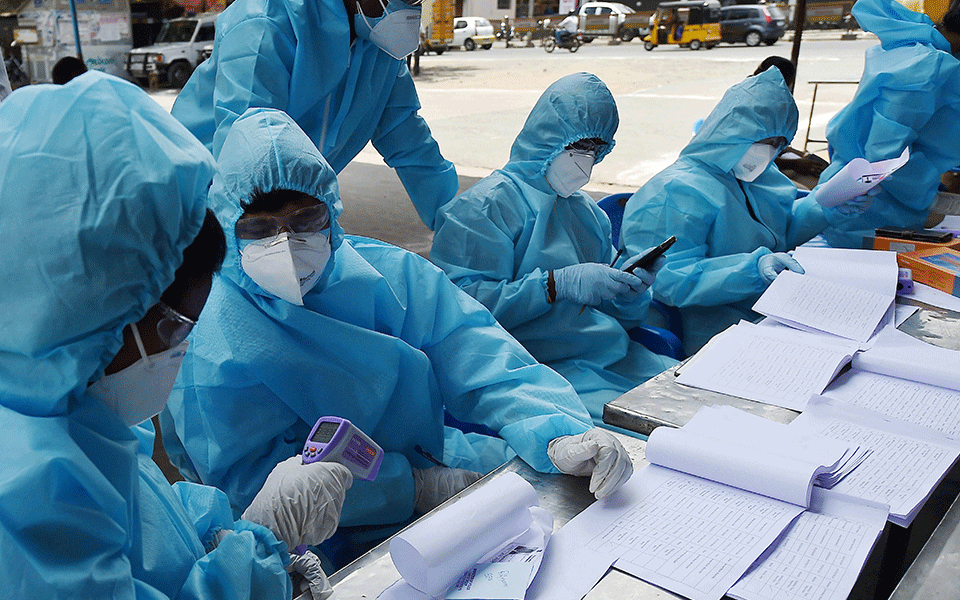Bengaluru(PTI): Karnataka on Monday reported 27,156 fresh COVID-19 infections and 14 deaths taking the total caseload and fatalities in the state to 32,47,243 and 38,445 respectively, the health department said.
The state had reported 34,047 cases and 13 deaths in the state on Sunday. With the decline in cases compared to Sunday, the test positivity rate too dropped from 19.29 per cent to 12.45 per cent. The case fatality rate was 0.05 per cent.
In its daily bulletin, the department said 7,827 people were discharged, taking the total number of recoveries to 29,91,472. The active cases stood at 2,17,297.
Bengaluru Urban district led the spike in cases in Karnataka with 15,947 infections and five deaths. Other districts too recorded fresh cases, including 1,770 in Mysuru, 1,147 in Tumakuru, 1,050 in Hassan and 784 in Dharwad.
There were three deaths in Dakshina Kannada and one each in Chikkaballapura, Dharwad, Kalaburagi, Ramanagara and Tumakuru. There were zero fatalities in 23 districts.
A total of 2,17,998 samples were tested in the state, including 1,81,136 RT-PCR tests on Monday, taking the cumulative number of specimens examined so far to 5.92 crore. There were 2,16,816 inoculations done taking the total vaccinations so far to 9.17 crore, the department said.
Let the Truth be known. If you read VB and like VB, please be a VB Supporter and Help us deliver the Truth to one and all.
Panaji (PTI): As part of a crackdown against tourist establishments violating laws and safety norms in the aftermath of the Arpora fire tragedy, Goa authorities on Saturday sealed a renowned club at Vagator and revoked the fire department NOC of another club.
Cafe CO2 Goa, located on a cliff overlooking the Arabian Sea at Vagator beach in North Goa, was sealed. The move came two days after Goya Club, also in Vagator, was shut down for alleged violations of rules.
Elsewhere, campaigning for local body polls, AAP leader Arvind Kejriwal said the fire incident at Birch by Romeo Lane nightclub at Arpora, which claimed 25 lives on December 6, happened because the BJP government in the state was corrupt.
An inspection of Cafe CO2 Goa by a state government-appointed team revealed that the establishment, with a seating capacity of 250, did not possess a no-objection certificate (NOC) of the Fire and Emergency Services Department. The club, which sits atop Ozrant Cliff, also did not have structural stability, the team found.
The Fire and Emergency Services on Saturday also revoked the NOC issued to Diaz Pool Club and Bar at Anjuna as the fire extinguishers installed in the establishment were found to be inadequate, said divisional fire officer Shripad Gawas.
A notice was issued to Nitin Wadhwa, the partner of the club, he said in the order.
Campaigning at Chimbel village near Panaji in support of his party's Zilla Panchayat election candidate, Aam Aadmi Party leader Kejriwal said the nightclub fire at Arpora happened because of the "corruption of the Pramod Sawant-led state government."
"Why this fire incident happened? I read in the newspapers that the nightclub had no occupancy certificate, no building licence, no excise licence, no construction licence or trade licence. The entire club was illegal but still it was going on," he said.
"How could it go on? Couldn't Pramod Sawant or anyone else see it? I was told that hafta (bribe) was being paid," the former Delhi chief minister said.
A person can not work without bribing officials in the coastal state, Kejriwal said, alleging that officers, MLAs and even ministers are accepting bribes.





